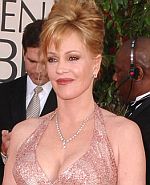With her whispery baby-doll voice and voluptuous figure, blonde, blue-eyed Melanie Griffith could easily have been typecast as bimbos or wide-eyed innocents. Instead, this savvy performer, the daughter of actors Peter Griffith and Tippi Hedren, chose to defy convention and undertake roles that demonstrated her versatility and capabilities. While her mother specialized in playing cool Hitchcock blondes (e.g., "Marnie" 1964), Griffith attempted (not always successfully) to transcend her party girl image (fueled in part by very public troubles with substance abuse). With a strong director and the right material, she could hold her own against powerhouse actors like Paul Newman and James Woods. Griffith made her first film appearance as an extra in "The Harrad Experiment" (1973) which featured her mother and soon-to-be first husband Don Johnson. Her first role of note, though, was as a runaway heiress in "Night Moves" (1975). That same year, she displayed a light comic touch as one of the pageant contestants in the satirical "Smile". Over the next decade, she worked less frequently, taking acting classes with Stella Adler and concentrating on her marriages to Johnson and actor Steven Bauer and motherhood. Ironically, it was a role much like those Tippi Hedren played that rejuvenated her career. Brian De Palma tapped Griffith for the pivotal role of porn actress Holly Body in his Hitchcock hommage "Body Double" (1984). Critics were pleasantly surprised by the actress' work and coupled with her role as the mysteriously rebellious adventuress in "Something Wild" (1986), Griffith's star was ascending. With her turn as Tess Magill, a Staten Island secretary with dreams of bettering herself ("I have a head for business and a bod for sin") in "Working Girl" (1988), her position as a top notch comic actress was solidified, crowned by a Best Actress Oscar nomination. But bad career advice and a string of box office disappointments nearly curtailed her career.
Mixed in with such misfires as a reteaming with De Palma as the Southern mistress of a Wall Street executive in the disastrous "Bonfire of the Vanities" (1990), a NYC detective who goes undercover in the Hassidic community in "A Stranger Among Us" (1992) and the ill-advised remake of "Born Yesterday" (1993) were the occasional prestige projects like the "Hills Like White Elephants" segment of HBO's "Women & Men: Stories of Seduction" (1990) and "Nobody's Fool" (1994), in which she excelled as Bruce Willis' unhappy wife who flirts with Paul Newman. Griffith also proved effective as a whorehouse madam in another rare TV excursion, the 1995 CBS miniseries "Buffalo Girls".
Griffith was cast as a ditsy bombshell in the wannabe screwball comedy "Two Much" (which served to introduce her to future husband Antonio Banderas) before transcending the relatively limited part of Nick Nolte's wife in "Mulholland Falls" (both 1996). Further stretching her screen persona, the actress bravely took on the role of Charlotte Haze, the mother of the nymphet "Lolita" (1997) in Adrian Lyne's remake. Griffith, who in her youth could have played the title role, gained weight and perfectly embodied the shrill blowsy Charlotte. Although she unsuccessfully attempted to find a small screen comedy, she landed a comedic role as a needy actress willing to trade sexual favors for an interview in Woody Allen's "Celebrity" (1998). But later that same year, Griffith delivered what is arguably her finest screen performance to date as a heroin user in "Another Day in Paradise". Co-star (and producer James Woods) handpicked her for the part, recognizing not only her ability to portray the character but the role's importance in repositioning her in the eyes of Hollywood. Although the production shoot was troubled, Griffith was mesmerizing as the mother figure in a band of low-rent criminals. She and Woods played off one another well, each eliciting the best in the other. If she stumbled a bit as a dizzy aspiring actress in Banderas' directorial debut "Crazy in Alabama" (1999), Griffith once again delivered playing Marion Davies in "RKO 281" (HBO, 1999), an exaggerated and somewhat fictionalized behind-the-scenes look at the making of the 1941 classic "Citizen Kane". She followed that triumph with a turn as an unstable woman who seeks out an old sweetheart in "Loving Lulu" and played a movie star kidnapped by an aspiring indie filmmaker in John Waters' darkly comic "Cecil B Demented" (both 2000).



